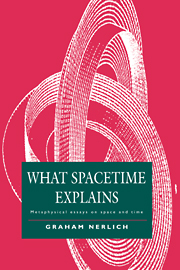Book contents
- Frontmatter
- Contents
- Preface
- Introduction
- Part One Ontology and methodology in relativity
- 1 On Learning from the mistakes of Positivists
- 2 What ontology can be about with Andrew Westwell-Roper
- 3 Special Relativity is not based on causality
- 4 Simultaneity and convention in Special Relativity
- 5 Motion and change of distance
- Part Two Variable curvature and General Relativity
- Part Three Time and causation
- Bibliography
- Index
3 - Special Relativity is not based on causality
Published online by Cambridge University Press: 19 October 2009
- Frontmatter
- Contents
- Preface
- Introduction
- Part One Ontology and methodology in relativity
- 1 On Learning from the mistakes of Positivists
- 2 What ontology can be about with Andrew Westwell-Roper
- 3 Special Relativity is not based on causality
- 4 Simultaneity and convention in Special Relativity
- 5 Motion and change of distance
- Part Two Variable curvature and General Relativity
- Part Three Time and causation
- Bibliography
- Index
Summary
Introduction
Almost everyone who has a considered opinion about what the conceptual foundations of SR (Special Relativity) might be, thinks that they lie in causality. (But see Lacey 1968, Smart 1969 and Earman 1972 for opposite opinions.) Cause is said to be the basic concept of the theory. The basic thesis (statement, postulate) of SR which makes use of this concept is said to be the Limit Principle: nothing (including causal processes) goes faster than light. This opinion about SR's foundations which I will call the standard view, is a philosophical one, not just because it is about conceptual foundations but also because many who hold it envisage the success of a programme attributed to Leibniz. It reduces the metaphysically uncomfortable ideas of space and time to the single familiar idea of physical material cause. This picture of the theory as specifying for itself how its bold new structure rests neatly on secure old foundations, as basic as can be, does much to shape our wider ideas about how people build their concepts and theories and about how these grow out of older concepts and theories.
Despite the widespread enthusiasm for it, and the careful and ingenious way it has been developed, the standard view remains doubtful. The Limit Principle is very probably not even a consequence of SR and certainly not among its basic postulates. It is uncertain which concept causality is and whether the relation is fundamental to anything. I think that the standard view is false and that is what I will try to argue.
Information
- Type
- Chapter
- Information
- What Spacetime ExplainsMetaphysical Essays on Space and Time, pp. 58 - 90Publisher: Cambridge University PressPrint publication year: 1994
Accessibility standard: Unknown
- 1
- Cited by
